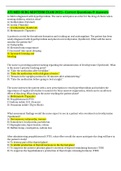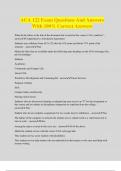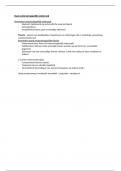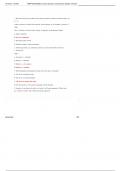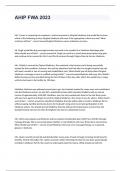A child is diagnosed with hypothyroidism. The nurse anticipates an order for the drug of choice when
treating children, which is what?
A) Liothyronine (Cytomel)
B) Liotrix (Thyrolar)
C) Levothyroxine (Synthroid)
D) Methimazole (Tapazole)
A patient is at risk for thrombosis formation and is taking an oral anticoagulant. The patient has been
newly diagnosed with hypothyroidism and placed on levothyroxine (Synthroid). What will the nurse
monitor the patient for?
A) Tachycardia
B) Elevated body temperature
C) Increased time spent sleeping
D) Increased bruising and
bleeding
The nurse is providing patient teaching regarding the administration of levothyroxine (Synthroid). What
is the nurse's priority teaching point?
A) "Take the medication after breakfast."
B) "Take the medication with a full glass of water."
C) "Remain in the upright position for 30 minutes after administering."
D) "Take the medication before going to bed at night."
The nurse instructs the patient with a new prescription to treat hyperthyroidism and includes the
importance of regular lab studies to monitor for bone marrow suppression, which can be an adverse
effect of this drug. What drug is the nurse teaching the patient about?
A) Methimazole (Tapazole)
B) Propylthiouracil (PTU)
C) Sodium iodide I131 (Generic)
D) Potassium iodide (Thyro-Block)
What assessment findings would the nurse expect to see in a patient who overdosed on levothyroxine
(Synthroid)?
A) Nervousness, tachycardia, tremors
B) Somnolence, bradycardia, paresthesia
C) Hyperglycemia, hypertension, edema
D) Buffalo hump, constipation, sodium loss
After administering propylthiouracil (PTU), what effect would the nurse anticipate the drug will have in
the patient's body?
A) To destroy part of the thyroid gland
B) To inhibit production of thyroid hormone in the thyroid gland
C) To suppress the anterior pituitary gland's secretion of thyroid-stimulating hormone (TSH)
D) To suppress the hypothalamus's production of thyrotropin-releasing hormone (TRH)
,The nurse provides teaching regarding levothyroxine to a 55-year-old patient diagnosed with
Hashimoto's disease. What statement made by the patient does the nurse interpret to mean that the
drug teaching had been understood?
A) "I can take this medication at any time of day."
B) "I should take this medication on an empty stomach in the morning."
C) "I may take this with a sip of water in the morning."
D) "If I feel nauseated, I may take this drug with an antacid."
The patient with hypothyroidism takes levothyroxine daily and has triiodothyronine (T3), thyroxine (T4),
and thyroid-stimulating hormone (TSH) levels drawn in the laboratory to check appropriateness of
prescribed dosage. What results would the nurse analyze as indicating the need for a higher dosage of
medication?
A) Elevated TSH, elevated T3, and reduced T4 levels
B) Reduced TSH, elevated T3 and T4
levels C) Elevated TSH, reduced T3 and T4
levels
D) Reduced TSH, T3, and T4 levels
A patient presents at the clinic with complaints of weight loss despite an increased appetite. The nurse
assesses this patient for what?
A) Chronic thyroiditis
B) Hypercalcemia
C) Hypothyroidism
D) Hyperthyroidism
What patient will the nurse assess most closely for secondary hyperparathyroidism?
A) The 12-year-old patient with hypothyroidism
B) The 68-year-old patient with chronic renal failure
C) The 35-year-old patient with diabetes mellitus
D) The 48-year-old patient with hyperthyroidism
What drug would the nurse appropriately administer to the patient to treat hypothyroidism?
A) Teriparatide
B) Methimazole
C) Propylthiouracil
D) Levothyroxine
The patient is 8 weeks pregnant and requires an antithyroid medication. The nurse identifies what drug
as the drug of choice for this patient?
A) Propylthiouracil
B) Radioactive iodine
C) Alendronate
D) Methimazole
The nurse is discharging a patient with a new prescription for levothyroxine. What would the nurse teach
the patient to report to her health care provider? (Select all that apply.)
, A) Nervousness
B) Insomnia
C) Chest pain
D) Loss of hair
E) Nausea
The nurse is teaching the patient how to take his newly prescribed alendronate and includes what
teaching points? (Select all that apply.)
A) "Take the drug in the morning."
B) "Wait 60 minutes before eating
breakfast." C) "Take the drug with a full glass
of water."
D) "Remain upright for 30 minutes after taking the medication."
E) "Eat a breakfast high in calcium after taking the medication."
The nurse is discussing the endocrine system with a class of nursing students. What substance would
the nurse label as a hormone?
A) Acetylcholine
B) Norepinephrine
C) Nucleic acid
D) Serotonin
What factors contribute to determining the drug of choice for a patient with epilepsy? (Select all that
apply.)
A) Age
B) Type of epilepsy
C) Patient characteristics
D) Preferred adverse effect
E) Gender
The nurse anticipates a reduced dosage due to cultural differences when caring for patients from what
cultural groups? (Select all that apply.)
A) Arab Americans
B) Asian Americans
C) African Americans
D) White American
E) Native American
A child is diagnosed with hypothyroidism. The nurse anticipates an order for the drug of choice when
treating children, which is what?
A) Liothyronine (Cytomel)
B) Liotrix (Thyrolar)
C) Levothyroxine (Synthroid)
D) Methimazole (Tapazole)
A patient is at risk for thrombosis formation and is taking an oral anticoagulant. The patient has been
newly diagnosed with hypothyroidism and placed on levothyroxine (Synthroid). What will the nurse
monitor the patient for?
A) Tachycardia
B) Elevated body temperature
, C) Increased time spent sleeping
D) Increased bruising and
bleeding
The nurse is providing patient teaching regarding the administration of levothyroxine (Synthroid).
What is the nurse's priority teaching point?
A) "Take the medication after breakfast."
B) "Take the medication with a full glass of water."
C) "Remain in the upright position for 30 minutes after administering."
D) "Take the medication before going to bed at night."
The nurse instructs the patient with a new prescription to treat hyperthyroidism and includes the
importance of regular lab studies to monitor for bone marrow suppression, which can be an adverse
effect of this drug. What drug is the nurse teaching the patient about?
A) Methimazole (Tapazole)
B) Propylthiouracil (PTU)
C) Sodium iodide I131 (Generic)
D) Potassium iodide (Thyro-Block)
What assessment findings would the nurse expect to see in a patient who overdosed on levothyroxine
(Synthroid)?
A) Nervousness, tachycardia, tremors
B) Somnolence, bradycardia, paresthesia
C) Hyperglycemia, hypertension, edema
D) Buffalo hump, constipation, sodium loss
After administering propylthiouracil (PTU), what effect would the nurse anticipate the drug will have in
the patient's body?
A) To destroy part of the thyroid gland
B) To inhibit production of thyroid hormone in the thyroid gland
C) To suppress the anterior pituitary gland's secretion of thyroid-stimulating hormone (TSH)
D) To suppress the hypothalamus's production of thyrotropin-releasing hormone (TRH)
The nurse provides teaching regarding levothyroxine to a 55-year-old patient diagnosed with
Hashimoto's disease. What statement made by the patient does the nurse interpret to mean that the
drug teaching had been understood?
E) "I can take this medication at any time of day."
F) "I should take this medication on an empty stomach in the morning."
G) "I may take this with a sip of water in the morning."
H) "If I feel nauseated, I may take this drug with an antacid."
The patient with hypothyroidism takes levothyroxine daily and has triiodothyronine (T3), thyroxine (T4),
and thyroid-stimulating hormone (TSH) levels drawn in the laboratory to check appropriateness of
prescribed dosage. What results would the nurse analyze as indicating the need for a higher dosage of
medication?
I) Elevated TSH, elevated T3, and reduced T4 levels
J) Reduced TSH, elevated T3 and T4 levels
K) Elevated TSH, reduced T3 and T4 levels
L) Reduced TSH, T3, and T4 levels

